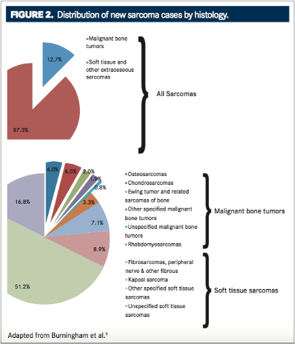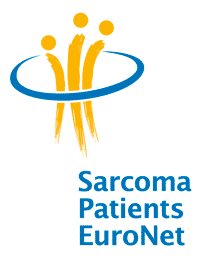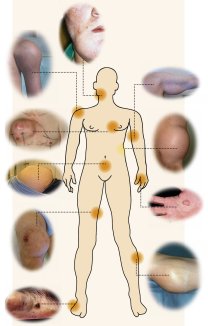Sarcomas are a diverse and relatively rare group of malignant tumors, originating in supportive and connective tissues such as bones, tendons, cartilage, muscle, and fat – the so called “mesenchymal cells”. They only account for slightly more than 1% of all cancer diagnoses in adults and for nearly 21% of all solid malignant cancers in children and young adults. Approximately 50 distinct subtypes exist, defined by the type of cells they arise from. Basically, sarcomas can occur at any age and are not restricted to a specific location of the body. However, there are two basic categories of sarcoma: soft tissue sarcoma and bone and joint sarcoma.
Sarcomas are often misdiagnosed, as they can arise anywhere in or on the body, frequently hidden deep in the limbs. Sometimes they are thought to be sports injuries and thus treated incorrectly. When eventually diagnosed, they may be large and difficult to remove surgically and they may have metastasized.
The vast majority of diagnosed sarcomas are soft tissue sarcomas, while malignant bone tumors make up just over 10%.

The rarity of the disease combined with the diverse number of subtypes can make sarcomas very difficult to treat correctly as well as to study. Therefore, please remember: Sarcomas need to be treated by specialists, if possible in specialized centers!
Understanding the names of malignant sarcomas
| Name: | Sarcoma type/tisue of origin: |
| Leiomyosarcoma | Smooth muscle |
| Liposarcoma | Fat tissue cells |
| Fibrosarcoma | Connective tissue cells |
| Osteosarcoma | Bone cells |
| Synovial sarcoma | Joint capsule cells |
| Rhabdomyosarcoma | Striated muscle |
| Angiosarcoma | Blood vessels |
| Chondrosarcoma | Cartilage cells |
| Neurofibrosarcoma | Nervous system cells |
| Lymphangiosarcoma | Lymph vessel cells |


